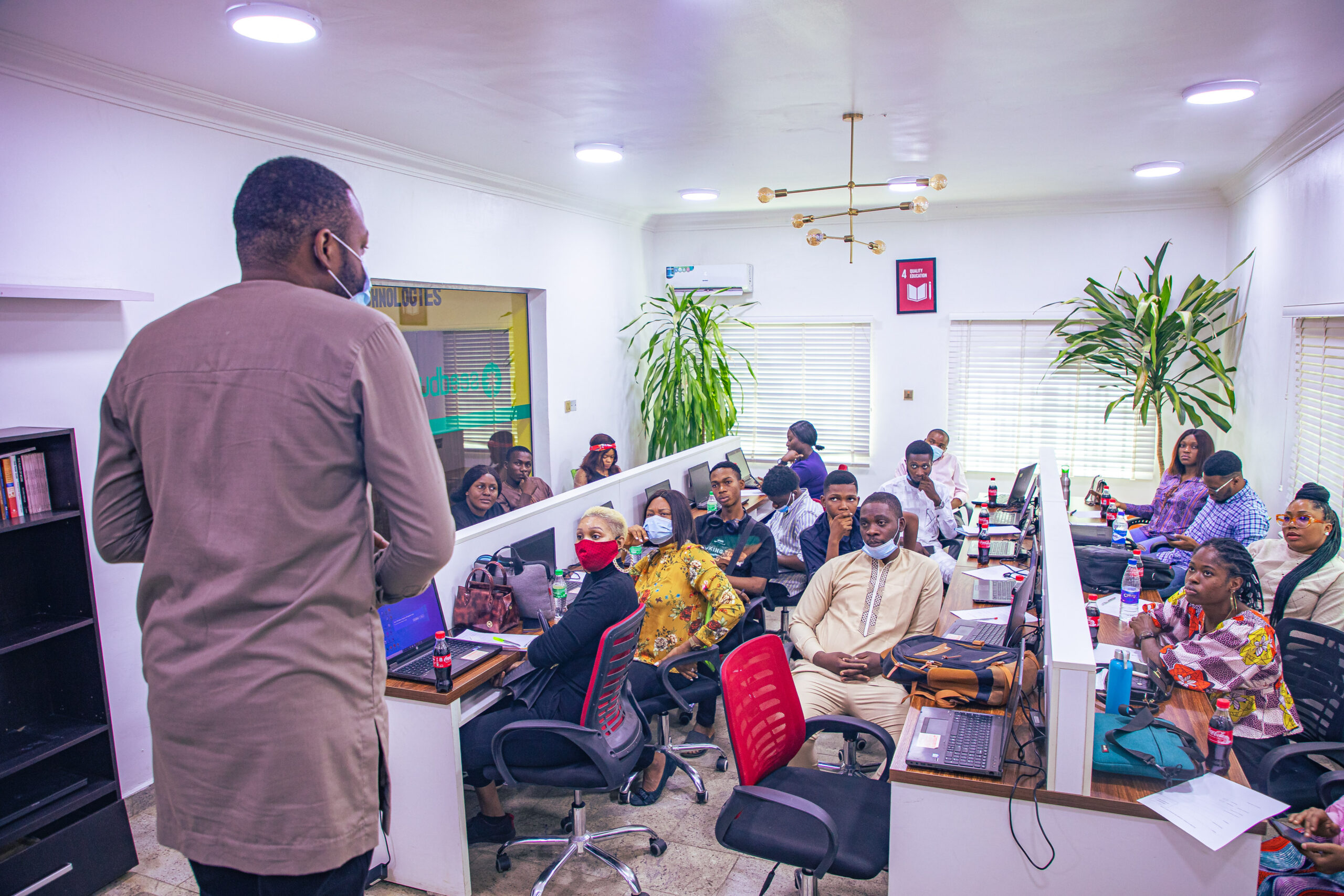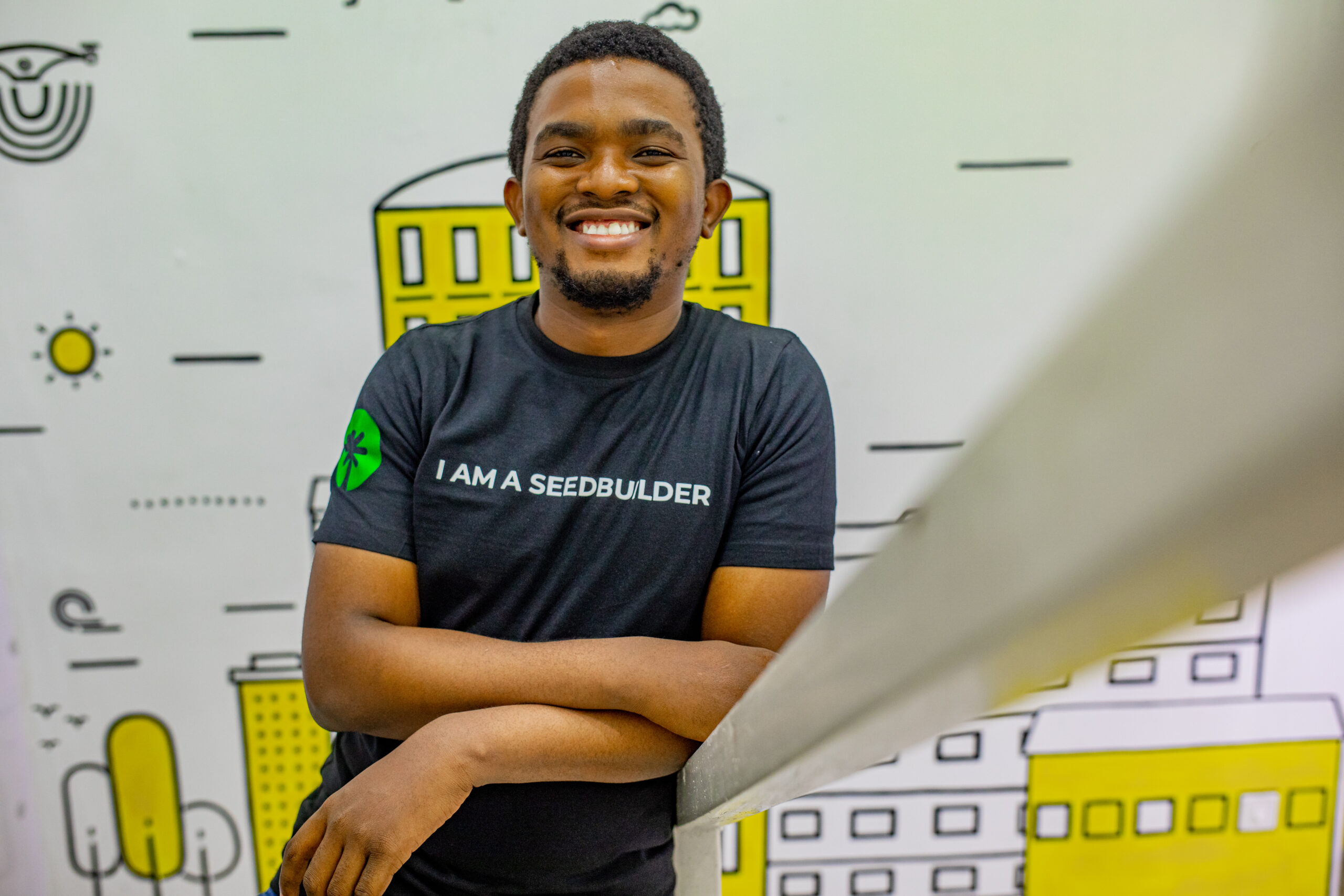Software Development Course in Lagos & Abuja
Hello there,
Become a certified Front End Software Developer in 3 months.

The world is undergoing an accelerated digital transformation, which is rapidly reshaping all industries and sectors.
According to the World Economic Forum, over 83 million jobs are going to be lost due to technology and artificial intelligence in 2027. If you do not want to be left behind, there’s no other time to learn a tech skill than right now. Software Development is one of the major lucrative tech skill you can learn today that would help you stay relevant in this evolving digital world.
Jumpstart Your Career as a Software Developer
Master software development and make your dream job a reality with our comprehensive course. From the basics to advanced techniques, you'll learn to build robust and scalable applications, gain hands-on experience through projects, learn industry best practices, and develop a portfolio of projects. Whether you aspire to join top tech companies or start your own venture, enroll now and launch your career in software development.
Your Earning Potential As a Software Developer
Looking to become a Software developer and earn a competitive salary? Look no further than our Software development course! Upon completion of our course, you will be equipped with the skills and knowledge needed to land a job as a Software developer, with a competitive yearly salary that can range from 10,000,000 Naira in Nigeria to 70,000 USD in the US and 35,000 Euros in the UK, according to industry standards.
Roles You Can
Get When You
Learn Software Development
There are several lucrative roles you can get when you have Software Development skills. Here are some of them.
Frontend Development
Web Development Fundamentals
- Languages and Tools of Web Development
- How the Web Works
- Inspecting HTTP Requests and Responses
- HTML & CSS Basics
- Inspecting Pages Using DevTools & Start9- Validating Web Pages
The Head Section
- Text
- Entities
- Hyperlinks
- Images, Videos, Audio
- Lists
- Tables
- Containers
- Semantic Elements
- Structuring a Web Page
Providing CSS
- Normalizing CSS
- Basic Selectors
- Relational Selectors
- Pseudo-class and Element Selectors
- Selectors Specificity
- Inheritance
- Colors, Color Pickers, Gradients
- Borders
- Shadows
- The Box Model
- Sizing Elements
- Overflowing
- Measurement Units
- Positioning Elements
- Floating Elements
- FlexBox
- Grid System
- Hiding Elements
- Media Queries
- Styling and Embedding Web Fonts
- Flash of Unstyled Text
- Font Services and System Font Stack
- Sizing Fonts
- Vertical and Horizontal Spacing
- Text Formatting
- Image Types and Formats
- Content and Background Images
- CSS Sprites
- Data URLs, Clipping, and Filters
- Supporting High-density Screens
- Switching Resolution
- Using Modern Image Formats
- Art Direction, Scalable Vector Graphics, Font Icons
- Form Basic
- Form Styling
- CSS Frameworks
- Text Fields
- Data Lists
- Dropdown Lists
- Check Boxes, Radio Buttons, Sliders, File Inputs
- Grouping Related Fields
- Hidden Fields
- Data Validation
- Submitting the Form
- Transformations
- 3D Transformations
- Transitions
- Animations
- Reusable Animations
- CSS Best Practices
- Variables
- Object-oriented CSS
- BEM (Block Element Modifier)
- Introduction to Javascript
- JavaScript in Browsers
- Separation of Concerns
- JavaScript in Node
- Variables and Constants
- Primitive and Dynamic Types
- Introduction to Objects, Arrays, Functions and Function Types
- Arithmetic Operators, Assignment Operators, Comparison Operators, Equality Operators, Ternary
Operator, Logical Operators, Logical Operators with Non-booleans, Bitwise Operators, and Operators
Precedence
- If...else
- Switch...case
- For
- While
- Do...while
- Infinite Loops
- For...in and For...of
- Break and Continue
- Object Basics
- Factory Functions
- Constructor Functions
- Dynamic Nature of Objects
- Constructor Property
- Functions are Objects
- Value vs Reference Types
- Enumerating Properties of an Object
- Cloning an Object
- Garbage Collection
- JavaScript Math
- JavaScript String
- JavaScript Date
- Template Literals
- Array Basics
- Adding Elements
- Finding Elements (Primitives and Reference Types)
- Arrow Functions
- Removing Elements
- Emptying an Array
- Combining and Slicing Arrays
- The Spread Operator
- Iterating, Joining, and Sorting an Array
- Testing the Elements of an Array
- Filtering an Array
- Mapping an Array
- Reducing an Array
- Function Declarations vs Expressions
- Hoisting
- Arguments
- The Rest Operator
- Default Parameters
- Getters and Setters
- Try and Catch
- Local vs Global Scope
- Let vs Var
- The this Keyword
- Changing this
JavaScript Dom
- Introduction to DOM
- Methods
- Document
- Elements
- HTML
- Forms
- CSS
- Animations
- Events and Event Listeners
- Navigation
- Nodes, Collections, and Node List
- Window
- Screen
- Location
- History
- Navigator
- Popup Alert
- Timing
- Cookies
JavaScript Web API(s)
- Form
- History
- Storage
- Fetch
jQuery
- Introduction to jQuery
- Selectors
- Events
- Hide/Show
- Fade
- Slide
- Animate
- Stop
- Callback
- Chaining
- Set, Get, Add, and Remove
- Css classes
- Css and Dimensions
- Introduction to jQuery AJAX
- Load
- Get/Post
Backend Development (Optional)
- Introduction to Node Js
- Global Object
- Modules
- Creating a Module
- Loading a Module
- Module Wrapper Function
- Path Module
- OS Module
- File System Module
- Events Module
- Event Arguments
- Extending EventEmitter
- HTTP Module
- NPM
- Working with NPM
- Introduction to RESTful Services and Express Js
- Environment Variables
- Config Files
- GET, POST, PUT, DELETE Request
- Route Parameters
- Request Headers and Query Params
- Express middleware
- Database and DBMS
- PostgreSQL
- MongoDB
- Unit and Integration Testing
- Linux
- Containerization Concepts
- Docker Basics
- Docker Images and Docker Compose
- Docker Networking and Orchestration
- Isolation and Security
- Minimizing image size and creating reproducible builds.
- Manage Docker images and repositories with Docker Hub and private registries.
- Service discovery, scaling, and rolling updates.
- AWS or Google Cloud Platform.
- Learn about the history and development of Linux.
- Linux distribution like Ubuntu or CentOS
- Virtual machine
- Basic Linux commands and the file system structure.
- Basic Linux commands and file system navigation.
- Create and manage users and groups in Linux.
- Manage file permissions and ownership in Linux.
- setting permissions on files and directories.
- Sudo to elevate privileges and perform administrative tasks.
- Basics of Linux networking, including IP addresses and network interfaces.
- Configure networking settings in Linux.
- Network diagnostic tools like ping, traceroute, and netstat.
- Manage them using tools like ps and top.
- Manage Linux services using systemctl and other tools.
- Linux boot processes and how to configuration and Management
- Types of Linux file systems, including ext4 and XFS.
- Create, mount, and unmount file systems in Linux.
- Linux storage technologies like RAID and LVM.
- File systems and storage in Linux Management.
- Linux security, including firewalls, SELinux, and SSH.
- Linux virtualization technologies like KVM and Docker.
- Linux containers and how to manage them using tools like LXC and systemd-nspawn.
- Linux automation tools like Ansible and Puppet.
- NGINX configuration directives, including common ones like server_name, root, and location.
- Configure NGINX to serve static files and handle dynamic content.
- Configure NGINX to proxy requests to other servers or applications.
- Configuring NGINX to serve static files, handle dynamic content, and proxy requests.
- NGINX security best practices, including SSL/TLS encryption and basic authentication.
- Configuration of SSL/TLS encryption in NGINX.
- Configuration basic authentication in NGINX.
- NGINX performance tuning and optimization techniques.
- Caching to improve NGINX performance.
- Load balancing to distribute traffic across multiple servers.
- Websockets and HTTP/2.
- NGINX to support websockets.
- NGINX to support HTTP/2.
- NGINX to support websockets and HTTP/2.
- NGINX deployment and management tools, like Ansible and Puppet.
- NGINX logs and monitoring tools to troubleshoot issues.
- Automation NGINX configuration and deployment using tools like Docker and Kubernetes.
- NGINX ecosystem, including popular modules and extensions.
- NGINX deployment and management tools, like Ansible and Puppet.
- NGINX logs and monitoring tools to troubleshoot issues.
- Automation NGINX configuration and deployment using tools like Docker and Kubernetes.
- NGINX ecosystem, including popular modules and extensions.
Full-Stack Development (Optional)
Take a combination of all modules in Frontend and Backend Development to become a certified Full-Stack Software Developer
Frontend + Backend = Full-Stack
What you'll learn
Learn how to develop effective and captivating websites using the latest web development tools and practices. Gain experience developing with HTML, JavaScript, CSS, and more.
Web Development Fundamentals
- Languages and Tools of Web Development
- How the Web Works
- Inspecting HTTP Requests and Responses
- HTML & CSS Basics
- Inspecting Pages Using DevTools & Start9- Validating Web Pages
HTML Fundamentals
- The Head Section
- Text
- Entities
- Hyperlinks
- Images, Videos, Audio
- Lists
- Tables
- Containers
- Semantic Elements
- Structuring a Web Page
CSS Fundamentals
- Providing CSS
- Normalizing CSS
- Selectors
- Inheritance
- Colors, Color Pickers, Gradients
- Borders
- Shadows
Advance HTML & CSS (Layout)
- The Box Model
- Sizing Elements
- Overflowing
- Measurement Units
- Positioning Elements
Advance HTML & CSS (Typography)
- Styling and Embedding Web Fonts
- Flash of Unstyled Text
- Font Services and System Font Stack
- Sizing Fonts
Advance HTML & CSS (Images)
- Image Types and Formats
- Content and Background Images
- CSS Sprites
- Data URLs, Clipping, and Filters
- Using Modern Image Formats
- Art Direction, Scalable Vector Graphics, Font Icons
Advance HTML & CSS (Forms)
- Form Basic
- Form Styling
- CSS Frameworks
- Text Fields
- Data Lists
- Dropdown Lists
- Check Boxes, Radio Buttons, Sliders, File Inputs
- Grouping Related Fields
- Hidden Fields
- Data Validation
- Submitting the Form
HTML & CSS Project
JavaScript
- Introduction to Javascript
- JavaScript in Browsers
- JavaScript in Node
- Variables and Constants
- Primitive and Dynamic Types
- Introduction to Objects, Arrays, Functions and Function Types
- Operators
JavaScript Objects
- Object Basics
- Factory Functions
- Constructor Functions
- Dynamic Nature of Objects
- Constructor Property
- Functions are Objects
- Value vs Reference Types
- Enumerating Properties of an Object
JavaScript Arrays
- Array Basics
- Adding Elements
- Finding Elements (Primitives and Reference Types)
JavaScript Functions
- Function Declarations vs Expressions
- Hoisting
- Arguments
- The Rest Operator
- Default Parameters
- Getters and Setters
- Try and Catch
- Local vs Global Scope
- Let vs Var
- The this Keyword
JavaScript Dom
- Introduction to DOM
- Methods
- Document
- Elements
- HTML
- Forms
- CSS
- Animations
- Events and Event Listeners
- Navigation
- Nodes, Collections, and Node List
jQuery
- Introduction to jQuery
- Selectors
- Events
- Hide/Show
- Fade
- Slide
- Animate
- Stop
- Callback
- Chaining
- Set, Get, Add, and Remove
- Css classes
- Css and Dimensions
Advance JavaScript
- Object Literals
- Factories
- Constructors
- Constructor Property
- Functions are Objects
- Value vs Reference Types
- Adding or Removing Properties
- Enumerating Properties
- Abstraction
- Private Properties and Methods
- Getters and Setters
- Inheritance
- Prototypes and Prototypical Inheritance
- Multilevel Inheritance
- Property Descriptors
- Constructor Prototypes
- Prototype vs Instance Members
- Iterating Instance and Prototype Members
React
- Introduction to React
- Components
- Class vs Fonction Component
- Understanding State
- Lifecycle Methods
- Component hierarchy
- Sharing Data between Components
- Props
- Props vs State
- Parent vs Child Components
- Rendering Lists
- Conditional Rendering
- Forms
- Tables
- NPM
- Using External Packages
- React Hooks
- Calling Backend Services
- Routing
- Authentication and Authorization
- Debugging React Apps
Node
- Introduction to Node Js
- Global Object
- Modules
- Creating a Module
- Loading a Module
- Module Wrapper Function
- Path Module
- OS Module
- File System Module
- Events Module
- Event Arguments
- Extending EventEmitter
- HTTP Module
- NPM
- Working with NPM
Project

Is this programme right for you?
This programme is designed for anyone with an analytic mindset who seeks professional development, a new career, a high income skill or digital skill empowerment.
We've trained over 5500 students
Requirements & Benefits
No prior background in computer science is required to start this course. However, basic computer literacy is required.
Commitment to undertake a technology course is also vital.
Experience fifteen practical modules steering you through each stage of your innovation journey. These modules also equip you with the necessary tools to think critically and create innovative solutions.
Features
Only 10 Slots Available – Secure Yours Now!
Become a Certified Software Developer
And get access to job opportunities in 5 months guaranteed.What you’ll get
Duration
Cost
Get ahead with learning resources, fast track templates, guides and softwares
Exclusive Software Development community to share ideas, knowledge and opportunities
TOTAL VALUE
₦389,000
₦289,000
₦725,000
GET 10% DISCOUNT NOW
₦350,000
₦350,000
₦650,000
Only 10 Slots Available – Secure Yours Now!
Join the Instructor-led virtual class with a special offer of 25% discount and pay N262,500 for either Frontend or Backend, or N487,500 for Full-stack.
Get 50% discount for all serving corp members today
Get Everything with our Special Offer of 25% off
(Offer ends 27th February, 2023)Pricing For Students Corp members Freelancers Students Everyone

Only 10 Slots Available – Secure Yours Now!
Think about it, if you don’t take action now, when will you take it? NEVER!
Pay Now! →
Offer Ends Soon. Take Advantage Now!
Frequently Asked Questions About This Course
- Full stack software development is the practice of building both the front-end and back-end components of a web or mobile application. Full stack developers are proficient in both server-side and client-side programming languages and frameworks.
- Backend development refers to the server-side of web development, which includes writing code that runs on the server and handles tasks like data storage, application logic, and security.
- Frontend development is the practice of building the user-facing part of a website or application. Frontend developers use HTML, CSS, and JavaScript to create interfaces that users interact with.
Our software development course is suitable for anyone who wants to pursue a career in web or mobile application development, or wants to learn how to build a complete application from start to finish.
Our physical classes are in Abuja and Lagos. We are located at 6a Embu street off Aminu Kano crescent, Wuse 2, and at 44, Ogunlana Drive, Surulere, Lagos.
Yes, we have options for instructor-led virtual learning and typical virtual learning.
Our courses are beginners-friendly, so there is no prerequisite for this course.
Assignments and assessments in our full stack software development course include coding challenges, projects, and peer reviews. These assignments and assessments are designed to help you apply the concepts you’ve learned in the course and get feedback on your performance.
Software development is a versatile and in-demand skillset, and there are many career opportunities available in web development, mobile app development, and software engineering. Some common job titles in software development include full stack developer, software engineer, frontend development, backend designer, server-side engineer, and web application developer.
Becoming good at Software Developer, requires a great deal of practice, attention to detail, while there is no timeline for how good it takes to become really good in Software Development. During the course of this training we will help you build your portfolio to be strong and be able to stand out in the job market.
After the completion of your capstone project, and passing your mock exams, you would get the Seedbuilders Certificate Of Completion.
Testimonial
Take a look at the success stories from Seedbuilders' Digital Training Professional Alumni.


"I am getting what I have been looking for as a scientist. It is great."
Nwaemeka Chinke
"I had very little knowledge on graphics design but during the period of my training, I learnt a lot"
Arubi Victory
"The experience was great, It helped me boost my previous experience on graphics design."
Iwuoha Esther
"I am getting what I have been looking for as a scientist. It is great."
Nwaemeka Chinke
"I had very little knowledge on graphics design but during the period of my training, I learnt a lot"
Arubi Victory
"The experience was great, It helped me boost my previous experience on graphics design."
Iwuoha Esther


Enjoy Seedbuilders Absolutely NO RISK to you!
100% Prompt service delivery. 100% Money-back Guarantee within 15 days. 100% Satisfaction Guaranteed.
We guarantee your satisfaction on our course with a full refund. If you are not satisfied with the performance promised because of some failure in our service, just let us know and we will refund every kobo you have paid.
Terms & Conditions Apply
Fill the form for the offer of 10% off now!
P.S.: Become a certified software developer 3 months.Terms & Conditions apply
Pay now and secure this golden opportunity to learn a tech skill in 2025 at a discounted rate.
Fill the form for the offer of 10% off now!
Only few seats left at this Special OFFER of 10% discount

Register Here
Accelerate your career and skill part. Register for Seedbuilder's training. Get amazing benefits and access to our community and job placement.

